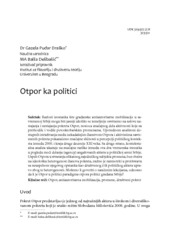Приказ основних података о документу
Otpor ka politici
Resistance to Politics
| dc.contributor | Orlović, Slaviša | |
| dc.contributor | Kovačević, Despot | |
| dc.creator | Pudar Draško, Gazela | |
| dc.creator | Delibašić, Balša | |
| dc.date.accessioned | 2021-10-26T17:35:10Z | |
| dc.date.available | 2021-10-26T17:35:10Z | |
| dc.date.issued | 2020 | |
| dc.identifier.isbn | 978-86-6425-077-1 | |
| dc.identifier.uri | http://rifdt.instifdt.bg.ac.rs/123456789/2327 | |
| dc.description.abstract | Razlozi izostanka šire građanske antiautoritarne mobilizacije u savremenoj Srbiji mogu biti jasniji ukoliko se temeljnije osvrnemo na uslove nastajanja i nestajanja pokreta Otpor, nosioca značajnog dela aktivnosti koje su prethodile i vodile petooktobarskim promenama. Uporednom analizom dostupnih istraživanja među nekadašnjim članstvom Otpora i aktivistima savremenih pokreta pokazaćemo značajne sličnosti u percepciji političkog konteksta između 2000. i kraja druge decenije XXI veka. Sa druge strane, kontekstualna analiza ukazuje na značajne razlike između ova dva vremenska trenutka u pogledu moći delanja (agency) angažovanih aktera u političkoj areni Srbije. Uspeh Otpora u stvaranju efikasnog zajedničkog subjekta promena, bez obzira na ideološku heterogenost članova pokreta, nužno je razmotriti u protivstavu sa neuspehom njegovog opstanka kao društvenog i/ili političkog aktera upravo zbog te heterogenosti. Možemo li govoriti o naučenim lekcijama, odnosno da li je Otpor u politici paradigma otpora politici građana Srbije? | sr |
| dc.description.abstract | The reasons for absence of broad civic anti-authoritarian activism in contemporary Serbia can be gleaned from a closer look at the circumstances of emergence and disappearance of the movement Otpor [Resistance], which played a major role in the lead-up and events of October 5th, 2000. Through a comparative analysis of available studies of former Otpor members, as well as other activists of various movements, we show significant overlap in perception of the political context of 2000 and the end of the 2010s. On the other hand, context analysis also shows significant differences between these two moments regarding the agency of actors on the Serbian political stage. Otpor’s success in producing an efficient common subject of change, despite internal ideological heterogeneity, must be weighed against the counter claim of failure to endure as social and/or political actor (precisely due to its internal differences). Can we speak of lessons learned? Could Resistance in politics be the source of civic resistance towards politics in Serbia? | sr |
| dc.language.iso | sr | sr |
| dc.publisher | Beograd: Univerzitet u Beogradu - Fakultet političkih nauka | sr |
| dc.relation | info:eu-repo/grantAgreement/MESTD/inst-2020/200025/RS// | sr |
| dc.rights | openAccess | sr |
| dc.rights.uri | https://creativecommons.org/licenses/by/4.0/ | |
| dc.source | Dvadeset godina 5. oktobra | sr |
| dc.subject | Otpor | sr |
| dc.subject | antiautoritarna mobilizacija | sr |
| dc.subject | promene | sr |
| dc.subject | društveni pokret | sr |
| dc.subject | Resistance | sr |
| dc.subject | anti-authoritarian mobilization | sr |
| dc.subject | agency | sr |
| dc.subject | October 5th | sr |
| dc.title | Otpor ka politici | sr |
| dc.title | Resistance to Politics | sr |
| dc.type | bookPart | sr |
| dc.rights.license | BY-NC-ND | sr |
| dcterms.abstract | Пудар Драшко, Газела; Делибашић, Балша; Отпор ка политици; Отпор ка политици; Ресистанце то Политицс; Ресистанце то Политицс; | |
| dc.citation.spage | 71 | |
| dc.citation.epage | 88 | |
| dc.type.version | publishedVersion | sr |
| dc.identifier.fulltext | http://rifdt.instifdt.bg.ac.rs/bitstream/id/8278/bitstream_8278.pdf | |
| dc.identifier.rcub | https://hdl.handle.net/21.15107/rcub_rifdt_2327 |

